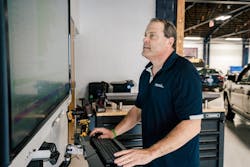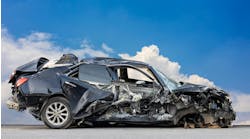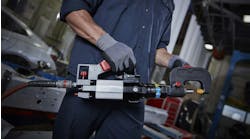At first glance, the results of the 2022 FenderBender Industry Survey might look a little strange when it comes to forecasting the future. The 506 survey respondents cited numerous serious challenges facing the industry, from the runaway technical advancements in vehicles (2%) to a shortage of qualified technicians (34%). But on the other hand, 72% of this industry cross-section said they expected their sales to go nothing but up over the next five years.
“I see a growth every year since I've been in business, there has always been an increase in business,” says J. Mark Smith, owner of J. Mark Smith Body Shop in Decaturville, Tennessee. “The United States, this whole country is just gonna keep getting bigger and bigger is my thought, you know, as far as the amount of people we have, [and] the amount of cars that's gonna be on the road.”
As Smith points out, some of the future optimism can be chalked up to a numbers game. There are of course going to be more cars, more drivers. And what’s driving even bigger numbers is the nature of the cars themselves. Cars are increasingly technical, increasingly complicated. That drives up repair costs and average orders.
But this is where a bit of trepidation steps in alongside the optimism. Some of the industry’s long time leaders are seeing collision repair changing rapidly. Change can be exciting, but also nerve wracking.
“I don't know exactly what the electric market is going to do to us,” continues Smith. “... I don't really know what the future is gonna hold as far as electric cars are going to work. What's going to be the life of that electric car? How many years are we going to be working on that electric car? Cars nowadays, you know, I live in a rural area. And you know, there's lots of cars on the highway [that are] 20 years old, electric cars [when they’re] 20 years old, are they going to still be on the road?”
Every shop owner wonders about where their shop is and where it’s headed. And they all have different ways of pulling those levers. FenderBender spoke to three of these leaders about how they keep things moving forward in 2022.
Shifting Trends in Education
Unlike a majority of survey respondents who reported they don’t have a higher education degree, a majority of the shop leaders FenderBender spoke to had college degrees: John Baker of Wallace Collision Center in Bristol, Tennessee, and Brian Davies of Body Works Plus in Charlotte, North Carolina. But while Baker’s industrial engineering degree and Davies’ mechanical engineering degree have certainly helped enhance their technical knowledge as they made their way in collision repair, they like Smith all learned the business the same way. It was working in their family shops from a young age.
“I worked for my dad from the time I was a small kid and I grew up as a little boy beating on fenders and trying to learn how to fix cars like the other guys were doing that worked for him,” says Smith, 62. “And then as I grew older, I just decided that was the profession I was going to go into.”
Davies was 11 or 12 by his estimation when he started working in a shop his father invested in. But it wasn’t a linear path from there to owning the Charlotte shop he’s helmed for 22 years. An engineering career followed college, designing and engineering bearings for large automakers, but an office job just wasn’t the right fit. It was his dad who helped him get back into the business, co-signing on a note for a building while Davies cashed out his 401(k) to make it happen.
Baker’s father and grandfather started an Oldsmobile dealership in 1961, which spawned a collision shop in the 1970s. Baker spent time in high school and college working at the shop, and like Davies worked in engineering after college before deciding to get back into collision repair. In the end he was able to marry both careers, as instead of hiring a consultant to institute lean processes, Baker’s father hired him and he’s gone on to run the collision end of things for the last four years.
While all three of these operators grew up in the industry to varying degrees, 69% of survey respondents said they do not have a parent who is or was involved in collision repair. Smith says his children don’t have any interest in getting into the industry, but he has a grandson who’s soon graduating with a business degree and plans to get into collision repair.
Smith recalls when he was that age there wasn’t much in the way of formal education expected when working at a body shop. But with the modern industry complicated by new technologies and processes, there’s definitely some advantages to having a wide range of skills.
“I've stressed for him to try to get that [degree], to where he would be able to maybe know a little bit more about the operations in the office than I've known since I had no education in that,” Smith says. “But everything that I've got I just picked up from my dad who taught me back years ago, as I've grown through the business I've tried to stay up to date.”
Keeping an Edge
The survey respondents this year are at a variety of different stages in their careers. But whether they’re in the first few years of operating a shop or ready to retire, a 45% majority of respondents said that management training for themselves is something they do at least once a year. Another 34% said they’ve been through training at least once in the past five years.
For Baker, Davies and Smith, training is also a key component in how they stay up to date with everything in the industry. While Davies has now operated Body Works Plus for 22 years, his experience upon first becoming an owner is instructive for anyone else starting out. He sought out some of the most experienced voices, both within the industry and on topics of leadership in general.
The Davies family circa 2000 wasn’t taking its vacations at Disney World or the like, instead it was north to Washington, D.C., where Davies sought to learn as much as he could. While the rest of the family was still asleep, Davies would rise early and meet a fellow early riser, well-known industry expert Mike Anderson, at his Beltway-area shop. At that time Davies had just bought his shop in an emerging part of downtown Charlotte and could take many lessons from Anderson.
“Mike Anderson was a legend really back then,” Davies says. “And I wanted to really kind of model myself [after him] because his shop was between Alexandria and D.C. And it was a little similar, it was kind of like … in the rough side of town, and it was a small footprint, I think he had, like, 10,000 square feet back then. And he probably had 20 employees. So, I called him and met him. And he was kind enough to let me come visit his shop. And he showed me the whole deal.”
That was just the beginning of Davies’ education in leadership. He convened with another Mike, Mike Jones of Discover Leadership Training, a program with industry clients such as the National Auto Body Council. It was working with Jones that inspired Davies to start the North Carolina Association of Collision and Repair (NCACAR) with some colleagues in 2016. Now a part of a united Carolina’s Collision Association, NCACAR formed a network of allies and mentors for area shops.
All three operators spoke about the importance of learning from others. All are active in their respective regional associations. Smith is the president of the Tennessee Collision Repairers Association, of which Baker is a member at large. The opportunity to share knowledge and experience is something all three of them took seriously.
“You get this many shop owners together, there's some problem that someone else has had,” says Smith. “... And most of the time, there's someone that's already been down that road. After we have a meeting, anybody there that night should have something they can take back to their shop the next day and use it to make the shop more profitable.”
And there’s more to running a shop than just industry knowledge. Davies has enrolled in a program designed for entrepreneurs called Strategic Coach out of Chicago, traveling to the Windy City once a quarter for three years at his own expense. Davies also is an avid reader of industry and general business topics, as is Baker.
“I probably read too much to be honest with you,” Baker says. “But I really think that's one of the reasons why we are trying to lead and at the forefront of gathering the new stuff that's coming out because that's really what in my opinion is what's really important.”
Reading List
Body Works Plus owner Brian Davies shares a few books that have been influential in his life and career:
“The E-Myth: Why Most Businesses Don't Work and What to Do About It” by Michael E. Gerber
-A step-by-step guide for the new entrepreneur taking a business from its infancy to leading it through growth and all the pitfalls along the way.
“Built to Last: Successful Habits of Visionary Companies” by Jim Collins and Jerry I. Porras
-A research-based examination of the history of some of the world’s most successful companies and the steps they took to stay on top.
“Good to Great: Why Some Companies Make the Leap & Others Don’t” by Jim Collins
-Following up on the findings of “Built to Last,” a study of what makes companies successful and how they separate themselves from the rest. says.
Investing in Training
A majority of survey respondents—40 percent—reported they have no specific budget for training. This can be taken in one of two ways, either that you can’t put a price on how much is too much for training, or shop owners aren’t being judicious enough in allocating the proper amount of funds for training. Viewed in concert with the second-highest percentage of response, 33% said they budget just 1-5% for training, it seems that most shops tend towards the latter. The message from the operators FenderBender spoke to was clear: when it comes to training, they would do whatever it takes.
“[Training is] something that I think is really important, and sure we should keep a close eye on what we spend on training, but I think my personal opinion is the training pays for itself,” says Baker.
Baker cites an example of glass work, which his shop formerly sublet out. But after growing tired of being on someone else’s schedule, he sent one of his techs to Auto Glass University in Wisconsin to bring that in house. That was a direct example of a net gain resulting from training, But whether it’s OEM training, paint supplier training or something else, all enhance the quality of repairs and thus the shop’s reputation and revenue.
All three men invest in training even beyond I-CAR, and all the shops are I-CAR Gold certified, something that tracks with the majority 55% of survey respondents who hold the same status. I-CAR is also the training survey takers invest in the most, at 79%. Only 23% of shops invest in management or career development training, and Davies is one of them.
“The ones that have been interested, I'd like to get them all to go, but the ones that have been interested we've sent them to Discover Leadership,” Davies says. “And I think that's a really good way to build a team and the philosophies there.”
More than half of survey respondents reported having no OEM certifications. In an era when collision repair is becoming less and less universal, that’s a number that could look far different in the 2023 survey. But these three operators are all ahead of the curve as they hold multiple certs and make OEM training a priority.
“Schooling is a required operation to run a business nowadays, because cars change so much every year, something is different,” says Smith. “So all of our guys have training each year. Costs money to send guys to school, but we want cars repaired the correct way. We're not a hack shop; we want everything to be done as OEMs want it to be done.”
Baker says that his shop can’t afford to send techs to training for every class they wish to take, but they’ve managed to support the 22 certifications his shop holds. He likens it to the construction of a house where there are many different specialities on a job site from framers to roofers. A house doesn’t get built without everyone, and a shop doesn’t do quality repairs without a qualified person for each job.
Leading the Next Generation
Proper training doesn’t just up the quality of a shop. It can also be an indicator of quality to technicians if a shop offers a full slate of training opportunities to further their careers. And those are shops that will be most attractive to new employees and help keep employees long term.
“Training is a really good retention tool for the technicians because your shop is offering opportunities that other collision repairers in your marketplace probably don't offer,” says Baker. “I think it's been a really good way to keep our staff engaged and continuing to learn the newer technology because, you and I both know it, it continues to replace itself pretty quickly.”
Shop owners can’t afford to overlook any tool that might help retain and/or recruit talent in a time when a majority 34% of survey respondents said a shortage of quality technicians was the single biggest challenge facing the industry. Smith concurs, saying he has gotten involved at the educational level by serving on the board at the local Tennessee College of Applied Technology (TCAT) campus. He’s hired a pair of young techs directly out of the collision repair program.
Other concerns from Baker and Davies included keeping up with the latest technology and knowledge to complete repairs properly. That leads back into training, and making sure their techs have the tools they need for the modern industry. Employees today expect and respond to different things. All three of these shop leaders have learned those lessons over the years.
“In the beginning, I thought that people knew what they should be doing all the time,” Baker says. “And I quickly realized that it's really a lack of my leadership that was causing failures, if you will. I mean, if there is an issue, the leader, that falls on your plate.”
Baker stresses the importance of standardized processes, as sometimes employees simply might not know that what they’re doing is wrong since there is no standard. Establishing those standards is a priority for Smith when thinking about his leadership style. Employees are empowered to self-evaluate the work they have done.
“I tell my guys, fix that car like it's your own car, and, like myself, if you're hard to please, if you feel like it's going to please you it's going to please anybody else,” Smith says. “That's always been my thought. If that car will please me when I get done working on it, then it's gonna please them because I'm picky at what I do, and I want it to be done like it's supposed to be done.”
An owner sets the tone for the shop, and that’s as true today as it was a century ago. But what it takes to lead a shop has changed. It’s not as much setting rigorous standards and demanding employees follow them. It’s keeping an eye on the future of the industry and what it means for the shop. It means doing all you can to bring in the most talented employees and ensuring they have incentive to stay there.
“There's the carrot and the whip,” says Davies. “And I just don't think that works nowadays anymore. I just don't think the younger people are getting it and even older people, they're just not tolerating it. So, my style is just trying to pay people well and reward them for, you know, job well done.”





